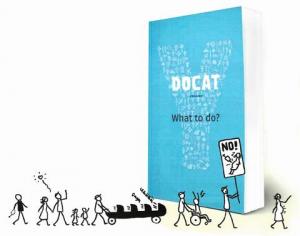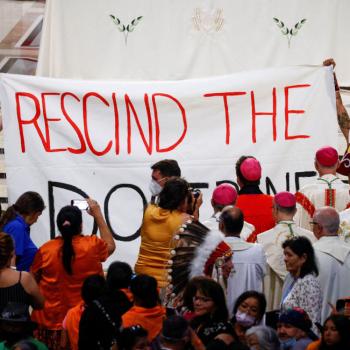A Look at Some Weakness amid Overall Strength

I wrote last week in praise of DOCAT, What to Do? – The Social Teaching of the Catholic Church. That gift from Pope Francis to the world as well as to young people does indeed deserve praise. Pope Francis, in a challenge to become actively involved in justice work, sums up its strong message: “A Christian who in these times is not a revolutionary is not a Christian.” (In a forward, “About this Book”) But the book has some weaknesses that made my experience with it, a good one that I hope is shared widely, less than it could have been.
One weakness that I noted already last week is the book’s length. Although it is attractive done, I think a strong editor could have sliced out maybe a third or a half of the verbiage without losing anything that needed saying. As it is, the book is not only a challenge to think about but also a challenge to read, especially for its primary audience, young people.
Before getting into more specific weaknesses, I want to reiterate that I consider DOCAT a major contribution and a fine book. I’d also like to reference another Patheos blog by Keith Michael Estrada that, in different ways from mine, both highly praises and strongly criticizes the DOCAT.
Justice and charity
A great strength of the book is how often it demands that we think about social justice and the lack of justice in many areas of life. All the more disappointing, then, is the fact that nowhere do we get a clear definition of social justice.
The difference between social justice and charity does show up in the famous quote by Dom Helder Camara:
When I give food to the poor, they call me a saint. When I ask why they are poor, they call me a Communist. (p.95)
Charity addresses an immediate need, an emergency situation. Justice tackles long-term or systemic factors, including habitual ways we think and act, that cause suffering. But that crucial distinction is missing where you want to see it spelled out.
The book asks, “What sorts of justice are there?” (#109) There are distributive justice, legal justice, and commutative justice. Then “social justice” either sums them all up or it’s an extension of legal justice. I don’t know how it could be both. What could have been pages gets one confusing paragraph that unaccountably repeats itself, word for word, at the end. This is one case where more words would have been helpful.
Scripture on justice and charity
There are many Scripture references but use of Scripture on social justice could have been more effective. DOCAT notes that Jesus loved and helped disadvantaged people. But he did more: He stood up to the religious-political system that pushed large groups of people to the outskirts of society. The first is charity; the second is social justice.
In the Old Testament kings were “to look out for social justice, make just judgments, perform service for the poor, and so on.” (DOCAT # 200) But the Old Testament gets much more specific. Rights extended to classes of people who are often overlooked. Slavescould rest on Sabbath. Widows and orphans received special consideration. Laws protected debtors: You could take a man’s coat as security for a debt but you had to give it back each night so he could sleep. The poor could glean for grain that harvesters, by law, had to leave behind. Then there was the Sabbath, the Sabbatical Year, and the Jubilee Year. All of these were ways God’s people aspired to a kind of justice, not charity. Together they help us think more expansively and provocatively about justice.
The Church dares to ask, with Archbishop Camara, why people are poor and without the necessities of life. She challenges us to take responsibility for the answer, and so does the DOCAT in many ways throughout. But that question, and how it relates to justice, not charity, is not clear.
A complaint about language
I had hoped that a document aimed at contemporary youth would have avoided the longstanding ecclesial habit of naming both men and women as men. In DOCAT as well as in YOUCAT, the earlier, more general youth catechism, I was disappointed.
There’s a justice issue here that, at least in English, has entered into the ways responsible people use language. At least among editors and publishers, referring to the entire human race as men or man or mankind is no longer proper English. I don’t know if it’s the same for the original German, but translators ought to be sensitive to the language they translate into. Youth especially in the English-speaking world now most often hear and read “people,” or “men and women,” or “humankind.” The church ought to have caught on to that by now.
I can’t resist a poke at the YOUCAT for an especially egregious example of “sexist” language. And the topic is sexism:
#61. In what does the equality of all men (!) consist?
All men are equal inasmuch as they have the same origin in the one creative love of God. All men have their Savior in Jesus Christ. All men are destined to find their happiness and their eternal blessedness in God
Hence all men are brothers and sisters. (!) Christians should practice solidarity not only with other Christians but with everyone and forcefully oppose racist, sexist, and economic divisions in the one human family.
Then there’s DOUCAT’s awful quote from a German bishop that certainly an English translator should have deleted. Instead it gets large-type prominence:
Do as God did: become a man! (p. 280)
It’s ironic when with such language the YOUCAT aims to condemn sexism, or the DOCAT to condemn any kind of social injustice.
Racism, sexism, anti-Semitism
DOCAT gives very little attention is given to discrimination on the basis of race and sex. Anti-Semitism gets no mention at all even though it’s one of the Church’s own great failings throughout much of our history, including in the years before the Second World War.
Several sections mention the rights of minorities but always in a general way without naming specific minorities or specific issyues. We hear nothing of racial discrimination in housing or the job market. There is no condemnation of the way people, by deliberate or unmindful use of language disrespect whole classes of people. We don’t hear about the overt racism of racist jokes or the unconscious (one hopes) but systemic racism whereby law enforcement kills and imprisons people of color in disproportionate numbers. In this country one would want some guidance on determining the obligations of an economy that has benefited from centuries of slave labor and expropriation of indigenous peoples’ lands.
Conclusion
Contributors to DOCAT deserve much credit for undertaking a difficult and important task. It presents the Church’s social teaching in a format suitable for young people or anyone not an expert already. They have brought together a treasure trove of teachings, explanations, and interesting quotations from a wide variety of sources. It has some weaknesses, but it certainly deserves a prominent place in faith formation programs and the general public.
Image credit: Catholic Shoppe USA















